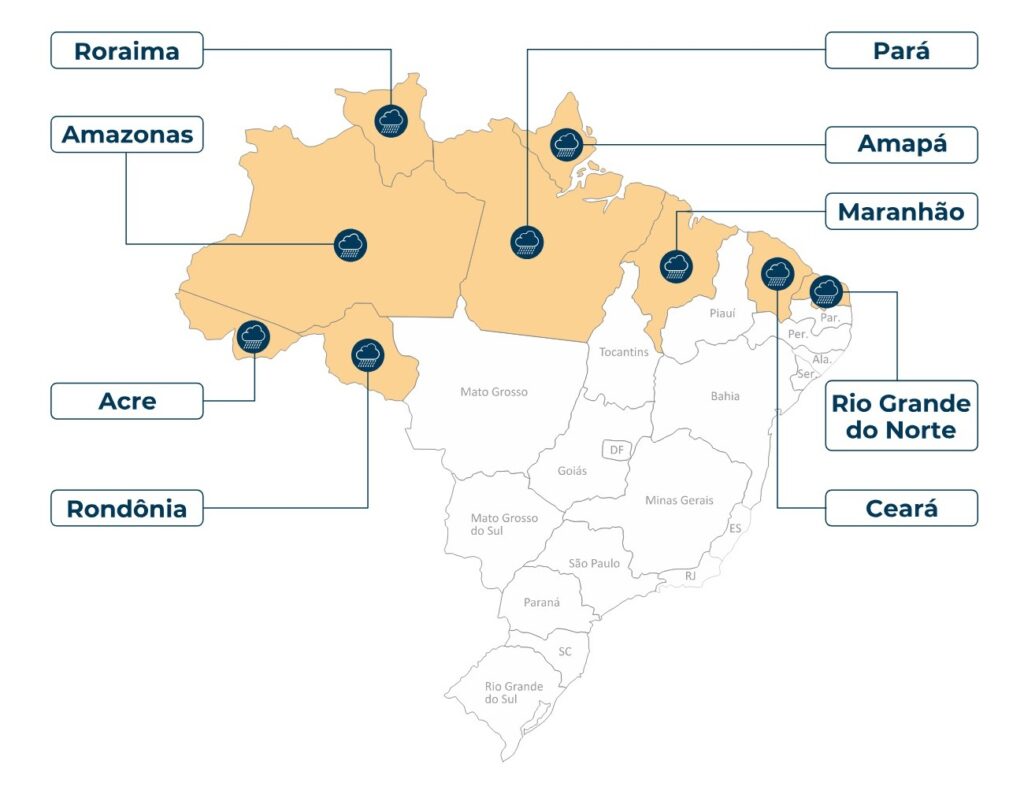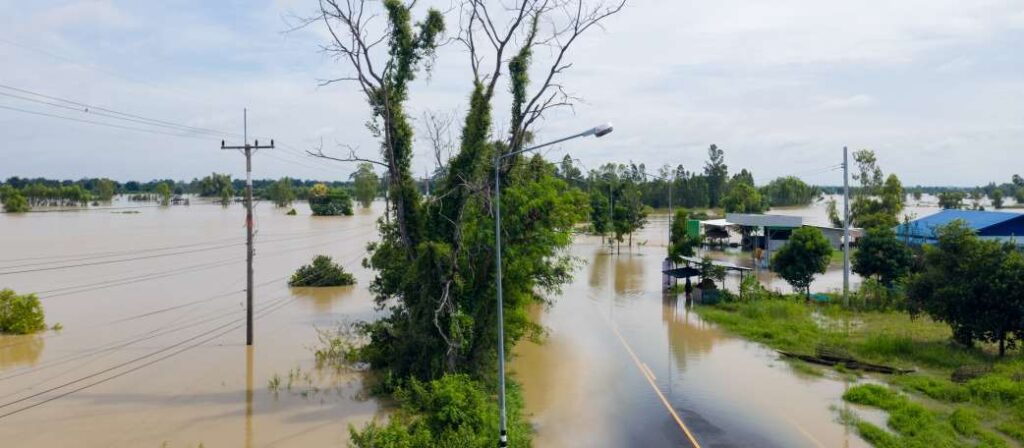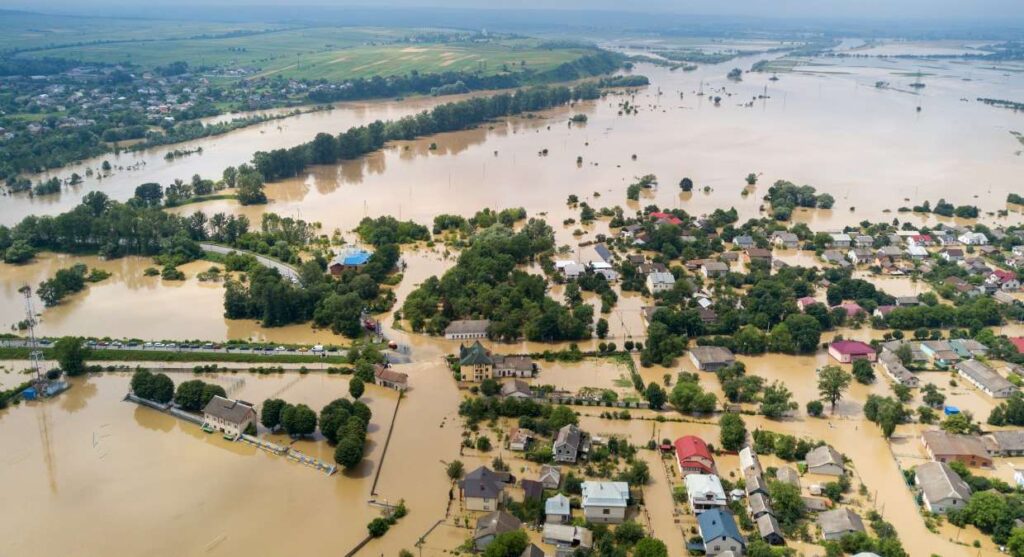Disruptions related to floods and subsequent landslides are frequently reported in Brazil during the regional rainfall periods. The southeastern region of Brazil experiences rainfall from November to March and in the northeastern region rainfall has been forecast between April to July. In 2023, the Intertropical Convergence Zone (ITCZ) also influenced the weather conditions over the north and Northeast regions in the country, leading to torrential rainfall, significant landslides and related disruptions. On 10 April, heavy rainfall resulted in flooding and significant damage across parts of Maranhao State. The communities near Trizidela do Vale have been significantly affected. Around 7,700 people have been reportedly displaced, approximately 35,900 individuals were affected by rising water levels and 65 municipalities are in a state of emergency.
Forecast for April 2023
In April 2023, the National Institute of Meteorology (INMET) Brazil has forecast rainfall in the following regions – Amazonas, Acre, Rondonia, Para, Maranhao, Amapa, Ceara, Rio Grande do Norte and Southern Roraima.


In the event of heavy rainfall, following regions in each municipality would be susceptible to flooding and landslides –
- Acre – Rio Branco, Assis Brasil, Brasileia and Xapuri.
- Alagoas – Penedo and Jacuípe, Viçosa, São José da Laje, Murici, Rio Largo.
- Amazonas – Manus, Manaquiri, Manacapuru and Careiro da Várzea, Anamã, Caapiranga, Borba Itacoatiara, and Maués
- Ceara – Guaramiranga, Itapipoca, Missão Velha, Aratuba and Uruburetama.
- Maranhao– Pedreiras, Santa Luzia, Açailândia
- Para – Altamira, Marabá and Itupiranga
- Pernambuco – Olinda, Recife, Barreiros, Canhotinho and Itaíba, Garanhuns, Jaqueira
- São Paulo – São Sabastião, Ilhabela, Ubatuba, Guarujá, Caraguatatuba, Bertioga and Guararapes
- Rio De Janerio – Angra dos Reis, Paraty, and Mesquita, Ilha Grande, Petrópolis
- Rio Grande do Norte– Natal
- Rondonia – Porto Velho, Cacoal, Nova Mamore
Recommendations
General Recommendations –
- Advised to engage in preemptive preparation for flooding and / or landslide situations.
- Advised to remain abreast with weather alerts issued by the National Institute of Meteorology (INMET) Brazil at https://portal.inmet.gov.br/ and plan travel accordingly.
- Consider keeping one’s documents and valuables in waterproof bags.
- Stock up on essentials such as medications, dry food, sanitizer, etc.
- As power cuts are likely, it is advised to ensure to stock up extra cells and that emergency torches and lights are functional.
In the event of a flood or landslide –
- Actively station oneself away from sewage lines, gutters, drains as well as electric poles and fallen power lines to avoid electrocution.
- Turn off power and gas connections before evacuating residential area.
- Pay attention to local authority warnings which are displayed on digital signs in the street and sent to hotels and hostels.
- Avoid non-essential travel during heavy rainfall. If you are outside when the rainfall starts, avoid walking in flooded areas, and in particular do not cross fast flowing waters. Be clear of areas close to riverbanks.
- Check Google Maps, follow traffic updates, be alert while driving, and have alternative routes mapped before commencing travel.
- If caught in flood water while driving, advised to drive in first gear and revive the engine to avoid water ingress through exhaust pipe. Avoid restarting vehicle in stalled water.
- In case the vehicle gets trapped, turn on headlights and hazard lights to attract attention for help.
- Adhere to evacuation orders or other guidelines as issued by local authorities.
- Residents who notice signs of cracks in their residence are advised to contact the Civil Defense by calling 199. It is also important to pay attention to the sound alerts installed in risk areas. The residents are advised to move to the support points established by the Civil Defense.
After the flood or landslide –
- Use disinfectants to keep surroundings clean. Block any entry-holes in the house so water does not get in.
- Take precautions to prevent the spread of water-borne and vector-borne diseases such as dengue, malaria, chikungunya.
For Businesses –
- Organizations are advised to conduct evacuation drills and spread awareness among employees and staff regarding the exit routes and evacuation protocols on a regular basis.
- In the event of a flood or landslide, organizations are advised to have an emergency response plan in place that outlines the steps to be taken to evacuate employees, including communication protocols and designated assembly points.
- A centralized communication system, including regular emails or text messages, which is accessible to all employees, can be set up in order to connect with the employees and inform them about the situation and any actions being taken.
- Advised to move critical equipment and documents to higher ground and shutting off utilities to prevent damage.
- Organizations may consider installing flood barriers or sandbags to prevent water from entering the premises.
- To avoid damage to the interiors due to strong winds and floodwater, consider keeping doors and windows closed.
- Advised to secure glass windows and doors with adhesive tape to prevent them from shattering due to strong wind gusts.
- Advised to turn off tpower supply to avoid short circuits during thunderstorms.
- Consider having power backups and prepare a flexible work schedule to avoid any business disruptions.

- Consider engaging in communication procedures with internal customers and stakeholders to inform them of business-critical delays and capacity reduction.
- Advised to install mosquito repellent devices and hand sanitizers dispensers to prevent the spread of water borne and/or vector borne illnesses.
Emergency Contact Numbers
- 190: Civil Police
- 192: Medical Emergency
- 193: Fire Service
- 194: Federal Police
- 197: São Paulo Civil Police and Rio de Janeiro Civil Police




